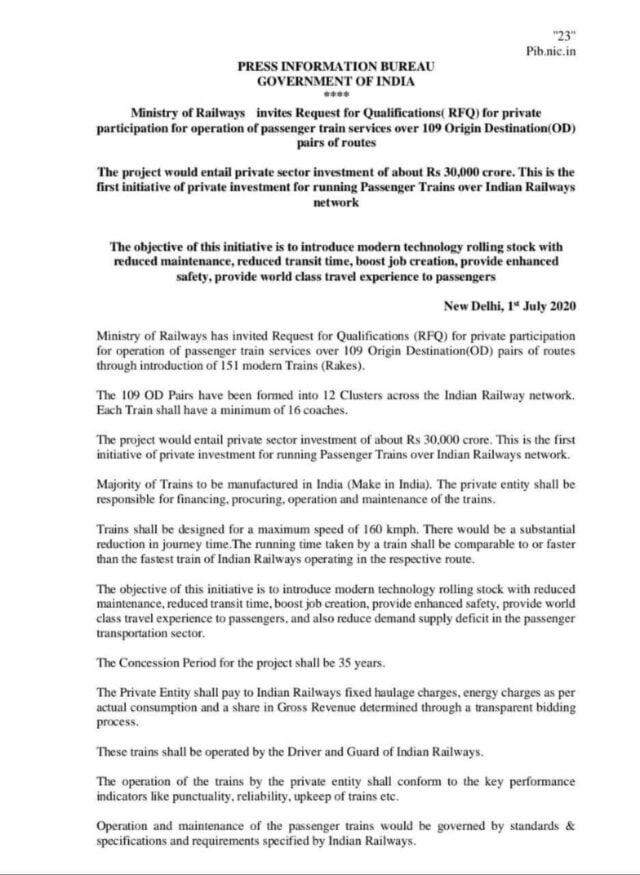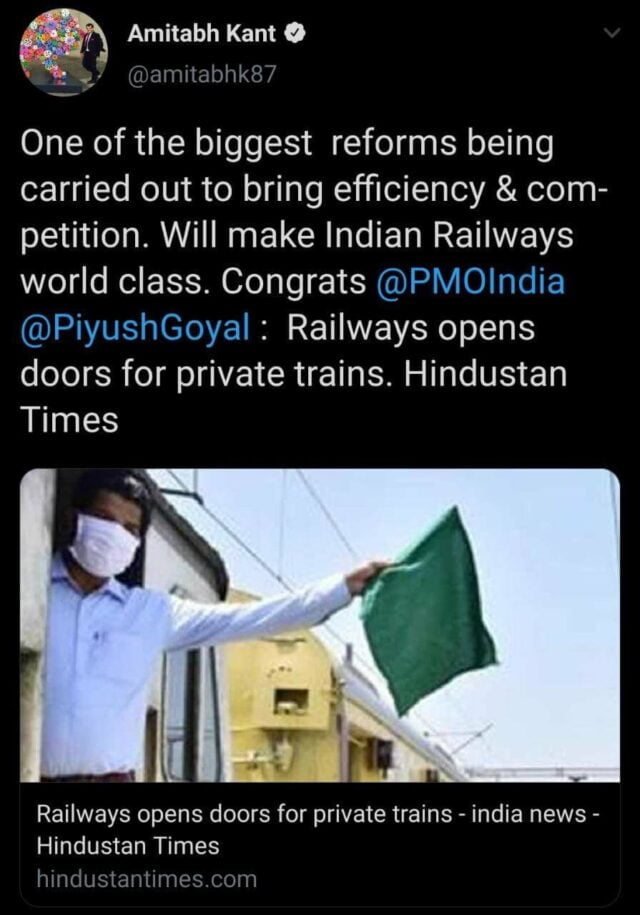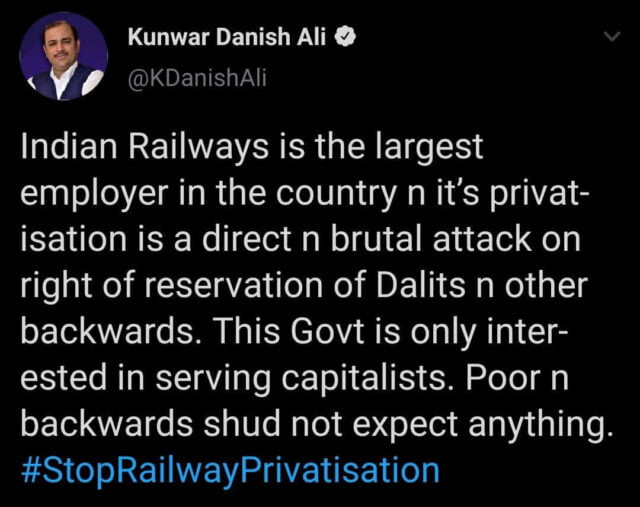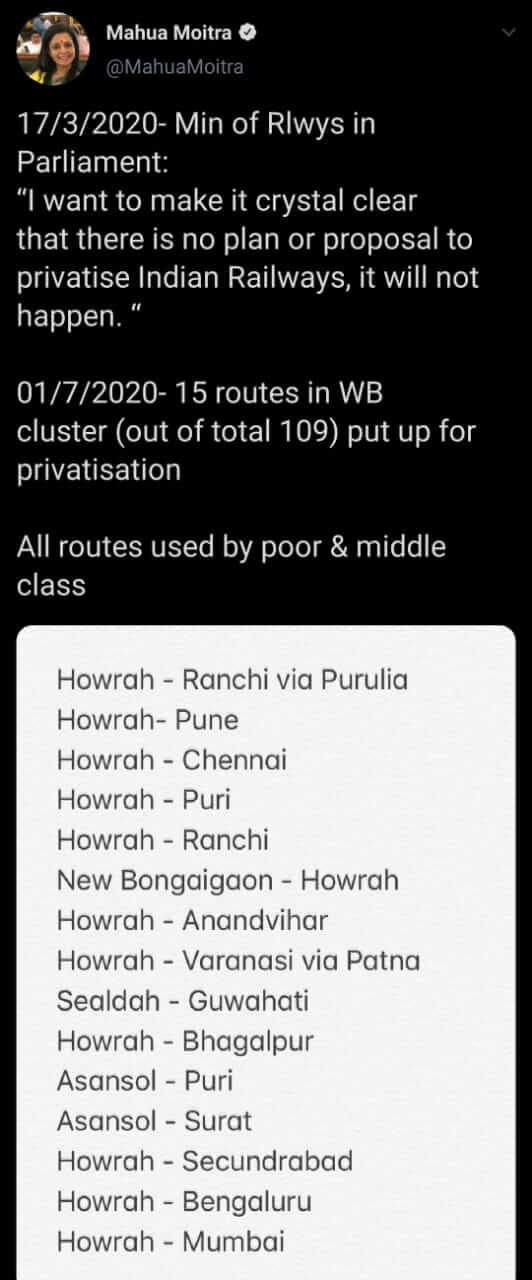Railways are the only mode of transportation in India that operates under government monopoly. The Indian Railways, operated under the Ministry of Railways, is the fourth-largest rail network in the world, in terms of the network size.
Sadly, the Indian Railways is notorious all over the world for its inefficient system. The widespread network has been often criticized for its deficiencies in terms of punctuality, safety, and customer services.
The entire system has been demanding a revamp for quite some time now. It seems like the Ministry of Railways’ recent move could help achieve this goal.
Ministry of Railways Has Invited Requests For Qualifications For Private Participation
In a press release dated July 1, the Ministry of Railways has invited Request for Qualifications (RFQ) for the participation of private players in the Indian Railways. The project aims at generating investment worth Rs. 30,000 crores.

The investments have been invited for the operation of passenger trains over 109 routes. The project will include the introduction of 151 modern trains in the network, with a minimum of 16 coaches in each train. Trains designed under this project will have a maximum speed of 160kmph.
Under this project, a majority of the trains would be manufactured in India. The qualified firms would be responsible for financing, procurement, operation, and maintenance of trains.
However, the recruitment of the driver and guard of the train will be carried out by the Indian Railways.
Read Also: World’s First Hotel To Be Equipped With Gold Plated Bathtub, Toilet Seat, Etc.
Potential Opportunities For The Indian Railways
The objectives of the project as specified by the Ministry of Railways itself, include:
- Introduction of modern technology in the Indian Railways,
- Reduction in the maintenance cost,
- Reduction in the transit time,
- Enhanced safety of passengers,
- Improvement in the quality of passenger services,
- Reduction in the demand and supply deficit in passenger transportation, and
- Creation of employment opportunities
Apart from these objectives, the fact that the manufacturing of trains will take place in India will help in the furtherance of the concept of Make in India.

A few years back, some experts suggested that the entry of private players in Indian Railways would enhance the competition in the network, thereby improving the quality of services and reducing the costs.
However, a lot of critical issues remain unaddressed by the ministry, and this questions the viability and the outcomes of the project.
Criticisms Against Privatisation Of Indian Railways
Since the government has not given any regulatory authority or policy-making powers to the private players, the balance of power seems tilted in favour of the government. The Bibek Debroy committee has pointed out that this project will conflict with the interests of private firms.
Experts believe that in the absence of an independent regulator, the playing field for private players would be uneven.

Moreover, Indian Railways tend to cross-subsidize passenger fares through freight revenues. If the government continues to do so, low train fares might not be financially viable for private firms.
Low rail fare is the primary reason why rail transportation is preferable over air transportation. So, if private firms increase the rail fares beyond a certain level, they might be moved out of the market.

Since railways are a public good, social welfare must be the primary concern for policymakers. The impact of privatisation on Indian Railways will unfold in the upcoming months.
Image Sources: Google Images
Sources: The Hindu, The Indian Express, The Economic Times
Find the Blogger: @RitikaaNijhawan
This post is tagged under: Indian Railways, Ministry of Railways, Privatisation of Railways, Tejas Express, Piyush Goyal, Revamping of Indian Railways, Private Investments, Employment Opportunities, Indian Economy, Make in India
Other Recommendations:
Indian Railways Is Doing A Lot In These Pandemic Times To Act As A Lifesaver





































